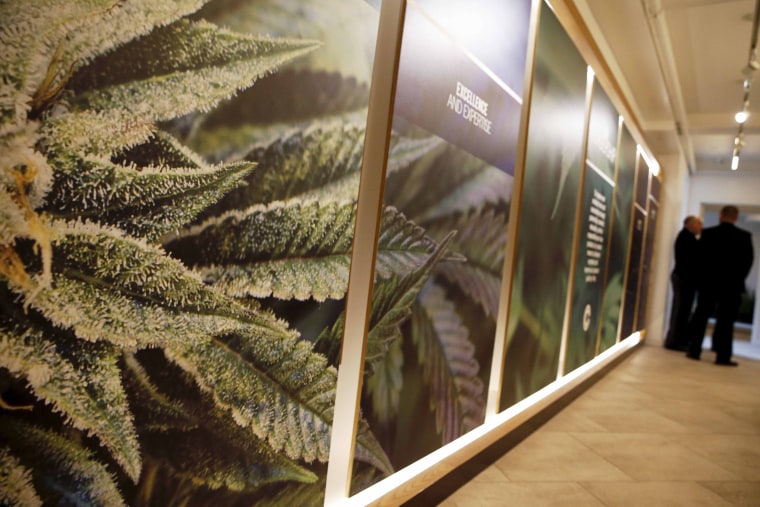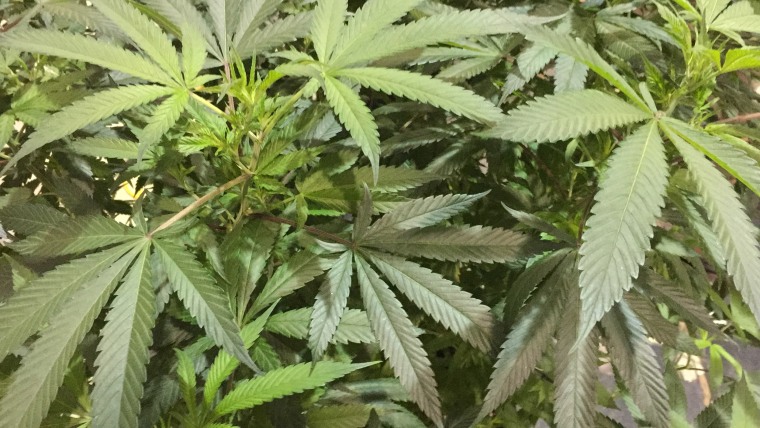With pot on the ballot in nine states, the big winner in next Tuesday’s election could be America’s legal cannabis industry. By 2020, legal market sales are expected to surpass $22 billion. And for states struggling with budget shortfalls, that extra revenue would be clearly welcome.
Voters in five states — Arizona, California, Maine, Massachusetts and Nevada — will decide whether to legalize recreational marijuana for adults. Medical marijuana is on the ballot in Arkansas, Florida, Montana, and North Dakota.
Supporters believe the marijuana measures will pass in California and Florida, and possibly several other states, because America’s attitude about pot has changed significantly in the last few years.
“Legalization of cannabis is one of the greatest business opportunities of our time."
“It’s well established that the majority of Americans now believe that the responsible use of marijuana by adults should not be a criminal offense,” said Paul Armentano, deputy director of NORML, the National Organization for the Reform of Marijuana Laws.
Two national surveys released in mid-October confirm that, with the Pew Research Center revealing that 57 percent of U.S. adults say the use of marijuana should be made legal — while 60 percent were opposed a decade ago.
The latest Gallup Poll showed that support for legalizing marijuana is at 60 percent, the highest ever recorded in this survey. After Colorado and Washington became the first states to allow the recreational use of pot, in 2013, support for legalization reached a majority for the first time.

Tax revenue generated from legal sales exceeds expectations
It is far too soon to assess the overall impact to society in states where weed has been legalized. A new report from the Drug Policy Alliance concludes that it’s been “so far, so good” in Alaska, Colorado, Oregon, Washington and Washington, D.C. They found that total marijuana arrests are down, young people smoking pot did not increase significantly, and traffic fatality rates have remained stable, so far.
But there is hard data on the total sales and tax revenue generated by this budding business.
Nationally, legal pot sales grew like a weed last year to $5.7 billion, up from $4.6 billion in 2014, according to a recent report from the ArcView Market Research and New Frontier. Recreational sales grew from $374 million in 2014 to $1.2 billion by the end of 2015.
The report projects strong sales growth this year, with retail sales hitting $7.1 billion, up about 26 percent from 2015. By 2020, the report says, legal market sales are expected to surpass $22 billion.
"Legalization of cannabis is one of the greatest business opportunities of our time and it’s still early enough to see huge growth,” noted Troy Dayton, CEO of The ArcView Group, in the report.
The legal cannabis industry has also created tens of thousands of jobs across the country.
“We’re seeing a massive transformation from an illicit economy worth tens of billions of dollars into a legal economy that will probably be worth even more than that,” said Ethan Nadelmann, executive director of the Drug Policy Alliance, a group that supports the legalization of marijuana.
“Legalizing marijuana, taxing and regulating it, is not going to solve a state’s budget problems. It’s not a panacea, but it definitely makes a significant contribution,” he said.
A look at the numbers
Tax revenues collected in Colorado, Washington, and Oregon have all exceeded initial estimates.
- Colorado’s legal pot sales of $996 million generated $121 million in combined sales tax and excise tax revenue last year and created 18,000 new jobs, according to the Marijuana Policy Group (MPG).
- Marijuana tax revenue in Colorado was three times larger than alcohol and 14 percent larger than casino revenue, the report noted.
- MPG projects that marijuana tax revenue in Colorado will eclipse cigarette tax dollars by 2020.
- Washington’s recreational marijuana industry brought in $427 million in sales and excise tax revenue on sales of $1.1 billion since 2014, according to 502data.com.
- Oregon’s Department of Revenue reported sales of more than $160 million so far this year, which generated more than $40 million in sales taxes.
But the extra income is just one drop in a very large bucket, according to Joe Henchman, vice president for legal and state projects at the Tax Foundation.
“It’s certainly quite a bit of revenue,” Henchman told NBC News. “It’s enough to pay for some extra police or some extra teachers, but you’re just not going to be able to replace many of your other taxes with that revenue.”
Proponents of cannabis initiatives often point to the tax benefits of a legal marketplace. They’re asking voters to tax them, something most businesses would never do. Henchman said the industry views this as a way to “legitimize it” and make the idea of legal sales acceptable to most people.
California here we come?
All eyes are on the Golden State, as voters there are asked to approve Proposition 64: Adult Use of Marijuana Act. Medical marijuana is already legal there. This would allow people to grow some weed at home and give municipalities the authority to allow recreational pot stores.
This election could be a tipping point that makes it impossible for Congress to keep ignoring the issue.
Based on the latest polling, Prop 64 is expected to pass.
Cannabis advocates believe a win in California on November 8 could open the floodgates for other states and Congress to legalize the purchase and recreational use of marijuana by adults.
Gallup noted, “If recreational marijuana use becomes legal in California this year, many other states will likely follow, because the Golden State often sets political trends for the rest of the U.S.”
Taylor West, deputy director of the National Cannabis Industry Association, believes this election will be “a tipping point” that makes it impossible for Congress to keep ignoring the issue. “If all nine initiatives were to pass, we’d have approximately 62 percent of the US population living in a state where medical or adult-use cannabis access is legal. That’s huge,” she said.
It's still an all-cash business
Even so, West does not expect Congress to legalize marijuana any time soon. She hopes lawmakers will pass legislation to allow the legal cannabis industry to access the nation’s banking system. That’s extremely difficult or impossible for these businesses to do right now because marijuana remains illegal at the federal level.
Running an all-cash business creates serious security problems for cannabis retail stores and dispensaries, including the constant threat of being robbed. It also makes it harder to for these legal businesses to pay their employees and the taxes they owe.
The Marijuana Business Access to Banking Act was introduced in July of 2013 by two democrats, U.S. Reps. Ed Perlmutter of Colorado and Denny Heck of Washington.
“We’ve just got to get these businesses away from being all cash,” Heck said. “It’s more than ridiculous, it’s not safe.”
The Perlmutter/Heck bill updates federal banking rules to resolve conflicts between federal and state laws. It would simply enable banks and credit unions to provide services to legitimate marijuana-related businesses in states that have legalized pot, without fear of sanctions from federal regulators.
Despite growing bi-partisan support, the chairman of the House Financial Services Committee has refused to let the bill come up for a vote, Heck told NBC News.
“Most of my colleagues understand that the safe thing to do is to allow these businesses to have access to banking services so they’re not all cash,” Heck said.
“We’re going to get wind in our sails as a consequence of this election, but whether it will be enough remains to be seen.”
Herb Weisbaum is The ConsumerMan. Follow him on Facebook and Twitter or visit The ConsumerMan website.
Editors note: An earlier version of this story said that Oregon, and not Washington, had legalized the recreational use of marijuana.
